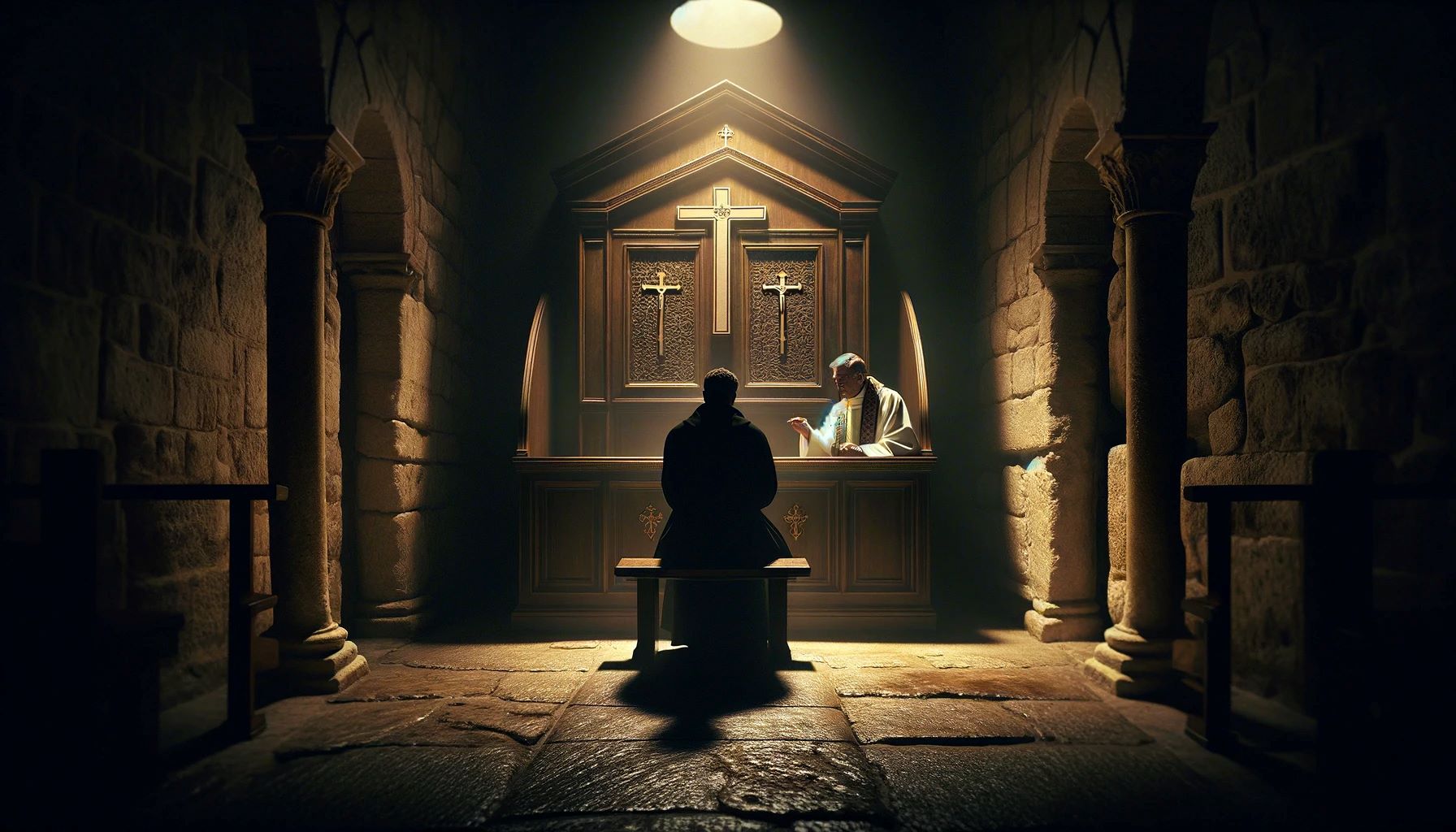Home>Christian Life>What Is The Confession Box In Church Called


Christian Life
What Is The Confession Box In Church Called
Published: March 5, 2024
Jason DeRose, Managing Editor at Christian.net, uses his expertise in religion and journalism to deepen understanding of faith's societal impacts. His editorial leadership, coupled with a strong academic background, enriches the platform’s diverse content, earning him recognition in both journalism and religious circles.
Discover the significance of the confession box in church, also known as the confessional, and its role in the Christian life. Learn about the sacrament of confession and its importance in spiritual growth.
(Many of the links in this article redirect to a specific reviewed product. Your purchase of these products through affiliate links helps to generate commission for Christian.net, at no extra cost. Learn more)
Table of Contents
The Purpose of the Confession Box
The purpose of the confession box, also known as the confessional, is to provide a sacred space for Catholics to confess their sins and seek absolution from a priest. It serves as a place for believers to express remorse for their wrongdoings and receive spiritual guidance and forgiveness. The confession box is a physical representation of the Catholic sacrament of reconciliation, which emphasizes the importance of acknowledging one's sins, expressing genuine contrition, and receiving penance as a means of spiritual healing and renewal.
-
Facilitating Confession: The primary purpose of the confession box is to create a private and intimate setting for individuals to confess their sins to a priest. This environment allows for open and honest communication between the penitent and the priest, fostering a sense of trust and confidentiality.
-
Seeking Forgiveness: Within the confession box, individuals have the opportunity to seek forgiveness for their transgressions. By vocalizing their sins and expressing genuine contrition, penitents can receive the assurance of God's mercy and the absolution granted by the priest, providing them with a sense of spiritual relief and renewal.
-
Receiving Spiritual Guidance: The confession box serves as a space for individuals to receive spiritual guidance and counsel from the priest. Through the act of confession, penitents can benefit from the wisdom and pastoral care of the priest, who offers support, encouragement, and advice to help them navigate their spiritual journey and strive for moral improvement.
-
Promoting Accountability and Reflection: By engaging in the sacrament of reconciliation within the confession box, individuals are encouraged to reflect on their actions, take accountability for their behavior, and commit to making amends. This process of self-examination and introspection contributes to personal growth and the cultivation of a virtuous life.
In essence, the confession box serves as a sacred space for Catholics to engage in the sacrament of reconciliation, fostering spiritual healing, forgiveness, and the pursuit of moral integrity. It stands as a tangible symbol of the Catholic Church's commitment to guiding and supporting individuals on their path to spiritual renewal and redemption.
The History of the Confession Box
The history of the confession box can be traced back to the early centuries of Christianity. In the early Church, public confession of sins was the norm, with penitents openly declaring their transgressions before the entire congregation. However, as the Church evolved, the practice of private confession emerged. During the Middle Ages, the concept of private confession gained prominence, and the need for a designated space for this purpose became apparent. This led to the development of the confession box as a means of providing privacy and confidentiality for individuals seeking to confess their sins to a priest. The use of the confession box became widespread during the Counter-Reformation, as the Council of Trent emphasized the importance of private confession and the role of the priest as the intermediary for absolution. The architectural design of the confession box evolved over time, reflecting the cultural and artistic influences of different eras. Today, the confession box continues to hold significance within the Catholic Church, preserving the tradition of private confession while adapting to the needs of contemporary believers.
The evolution of the confession box reflects the historical and theological developments within the Catholic Church, highlighting the importance of the sacrament of reconciliation and the pastoral care provided by the clergy. The history of the confession box underscores its enduring role as a sacred space for spiritual healing and the restoration of one's relationship with God.
The Role of the Priest in the Confession Box
-
Facilitating the Sacrament: The priest plays a pivotal role in facilitating the sacrament of reconciliation within the confession box. As the designated minister of the Church, the priest provides a welcoming and non-judgmental environment for penitents to confess their sins. Through active listening and compassionate guidance, the priest creates a space for individuals to unburden their hearts and seek spiritual healing.
-
Granting Absolution: One of the central duties of the priest in the confession box is to grant absolution to the penitent. Drawing upon the authority bestowed by the Church, the priest pronounces the words of absolution, imparting God's forgiveness and reconciling the individual with the divine mercy. This act of absolution signifies the priest's role as a conduit for God's grace and forgiveness.
-
Offering Counsel and Penance: Within the confession box, the priest provides pastoral care by offering counsel and guidance to the penitent. Through empathetic dialogue, the priest offers spiritual advice, encouragement, and practical steps for moral and ethical growth. Additionally, the priest assigns penance, which serves as a means for the penitent to express their willingness to make amends and seek spiritual renewal.
-
Upholding Confidentiality and Trust: The priest upholds the sacred trust of confidentiality within the confession box. By maintaining strict confidentiality, the priest ensures that the penitent can openly express their sins without fear of judgment or disclosure. This commitment to confidentiality fosters an environment of trust and encourages sincere and honest confession.
-
Guiding Spiritual Transformation: Through their role in the confession box, the priest guides individuals on a path of spiritual transformation and moral renewal. By offering spiritual direction, the priest assists the penitent in discerning ways to overcome sin, grow in virtue, and deepen their relationship with God. The priest's guidance and support contribute to the penitent's spiritual journey and pursuit of holiness.
In essence, the priest's role in the confession box encompasses the compassionate administration of the sacrament of reconciliation, the provision of spiritual counsel, and the nurturing of a trusting and supportive environment for individuals seeking forgiveness and renewal. The priest's presence in the confession box reflects the Church's commitment to extending God's mercy and grace to all who seek reconciliation.
The Importance of the Confession Box in Church Today
The confession box holds significant importance in the contemporary Catholic Church, serving as a sacred space for spiritual healing, reconciliation, and the nurturing of a vibrant faith community. Its relevance extends beyond traditional practices, encompassing the following key aspects:
-
Spiritual Healing and Renewal: The confession box remains a vital avenue for individuals to seek spiritual healing and renewal. In a fast-paced and often tumultuous world, the opportunity to engage in the sacrament of reconciliation within the confession box provides a profound sense of relief, peace, and restoration. It allows individuals to confront their shortcomings, seek forgiveness, and experience the transformative power of God's mercy.
-
Personal Accountability and Moral Growth: The confession box encourages personal accountability and moral growth. By acknowledging their sins and expressing genuine contrition, individuals take responsibility for their actions and commit to making amends. This process fosters a culture of integrity, humility, and ethical awareness, contributing to the moral fabric of the faith community.
-
Community Building and Support: The confession box plays a pivotal role in fostering a sense of community and support within the Church. It provides a space for individuals to connect with the clergy, seek guidance, and receive pastoral care. Through the act of confession, believers are reminded of their interconnectedness and shared journey of faith, promoting empathy, understanding, and solidarity within the community.
-
Preservation of Tradition and Sacramental Life: Embracing the confession box preserves the rich tradition and sacramental life of the Catholic Church. It upholds the sacredness of the sacrament of reconciliation, emphasizing the enduring value of seeking forgiveness, receiving absolution, and participating in the redemptive work of God's grace. This commitment to tradition reinforces the Church's spiritual heritage and the continuity of its teachings.
-
Encounter with Divine Mercy: Within the confession box, individuals encounter the boundless mercy and compassion of God. The act of confessing one's sins and receiving absolution reflects the profound belief in God's unconditional love and willingness to forgive. This encounter with divine mercy instills hope, inspires spiritual growth, and reaffirms the foundational tenets of the Catholic faith.
In summary, the confession box holds immense importance in the contemporary Church, serving as a sanctuary for spiritual reconciliation, moral growth, and the embodiment of God's mercy. Its enduring relevance underscores the Church's commitment to nurturing the spiritual well-being of its members and upholding the transformative power of forgiveness and grace.















